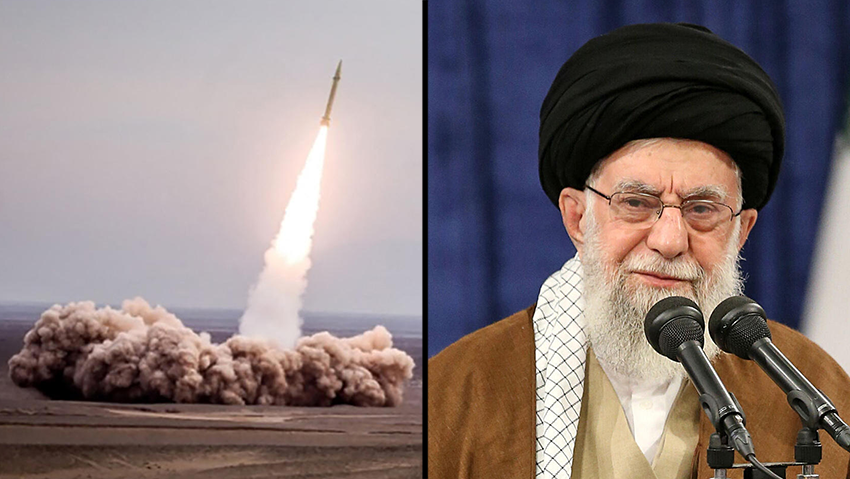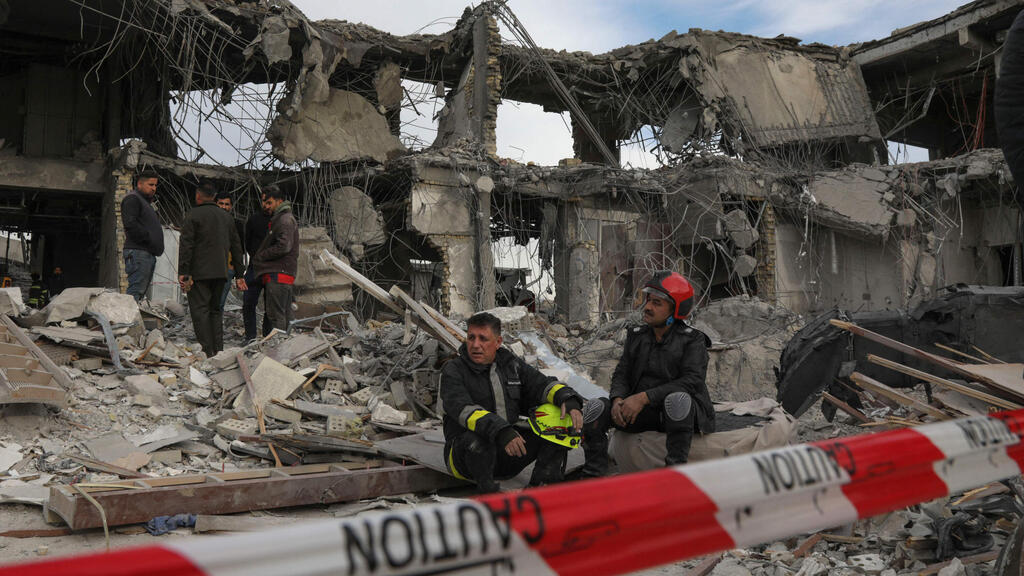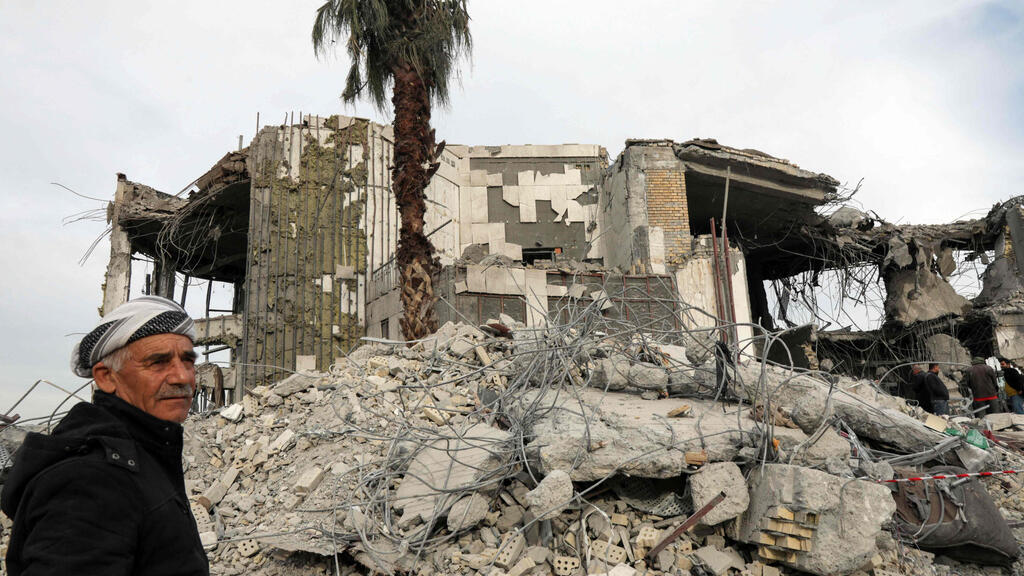In an unprecedented incident, Iran bombed targets in Erbil governorate, the capital of the Kurdistan region in northern Iraq, with ballistic missiles on Tuesday, resulting in four deaths and a number of injuries. Even more dramatically, the bombing has caused a political crisis, the first of its kind between Baghdad and Tehran.
Read more:
The Iraqi Foreign Ministry confirmed in a statement that it had recalled its ambassador to Iran, Naseer Abdul Mohsen, “for the purpose of consultations against the backdrop of the recent Iranian attacks on Erbil, which caused martyrs and wounded.”
This measure is considered unprecedented, as Iraqi Prime Minister Mohammad Shia al-Sudani belongs to the “coordinating framework,” a group of Shiite parties loyal to Iran that own armed militias, led by former Prime Minister Nouri al-Maliki.
No Iraqi government has ever objected to any bombing or Iranian military security presence inside Iraqi territory. Since 2005, Iraq has had a succession of prime ministers from the pro-Iranian Dawa party, and the Iraqi constitution stipulates that the prime ministership must go to the Shiite sect.
Another notable development is that Iraq submitted an official complaint to the U.N. Security Council and the United Nations General Assembly over the Iranian missile aggression in Erbil, the Foreign Ministry said.
The Iraqi prime minister’s adviser, Khalid Al-Yaqoubi, issued a statement describing the Iranian bombing of Erbil as “a major violation of Iraqi sovereignty and a violation of the principles of good neighborliness,” and said that “the bombing will change the nature of the relationship between Baghdad and Tehran.”
The statement also accused Iranian security leaders of misleading their subordinates to cover up their failures over the Jan. 3 bombings in Kerman, Iran, in which at least 85 people were killed. In that attack, two explosions occurred during a commemoration marking the fourth anniversary of the assassination of Iranian Quds Force commander Qasem Soleimani by a US drone in Iraq in 2020. The explosions were claimed by the Islamic State group.
Iran claimed in a statement that its targeting of Erbil was in response to the Kerman attack and that it targeted a headquarters of Israel’s Mossad intelligence agency.
However, Iraqi national security adviser Qasim al-Araji, a member of the Iranian-backed Badr militia, posted on the X social media platform: “We conducted a field inspection, accompanied by members of the investigative committee, at the home of the targeted businessman last night in Erbil, and it became clear that the allegations about targeting a Mossad headquarters are unfounded. We continue meetings with the security services in the region, and we will submit the report to the respected commander-in-chief.”
The Kurdistan Regional Government of Iraq issued a statement saying that the attack on Erbil had killed Bashro Diziyi, a prominent local businessman who owned real estate and security services companies, along with members of his family.
“The Revolutionary Guard and the Iranian Quds Force are preparing for a possible war with the U.S., especially after the maritime security alliance to target the Houthis in Yemen. There are unprecedented moves of military trucks and helicopters in the Jurf al-Sakhar area south of Baghdad. There is large equipment being redeployed and distributed in the desert areas,” an Iraqi police colonel who wished to remain anonymous said.
“Since October 2014, after the liberation of the Jurf al-Sakhar area from Islamic State, the area has become the headquarters of the Quds Force and the Iranian Revolutionary Guard, and no militias other than the Iraqi Hizbullah are allowed to be present in this area. Even the Iraqi security forces cannot enter the area. We are only standing on the outskirts,” the colonel said.
“This area has become a location for storing Iranian weapons. It also contains prisons, military training headquarters, command headquarters, and drug cultivation is taking place there. This information is confirmed through intelligence reports and monitoring movement in and out of it, but the government cannot take any action.”
Residents of Babil governorate, south of Baghdad, confirmed to The Media Line that they had seen military movements and covered trucks entering and leaving this area.
Ali Abboud, a shop owner near the entrance to Jurf al-Sakhar, told The Media Line, “For about a month, movements have increased at an unprecedented pace, and most of the equipment is moved at night.”
Jurf al-Sakhr, 60 kilometers south of Baghdad, is an agricultural area of about 283 square kilometers that was inhabited by the Janabi tribe. It was one of the hot areas that witnessed several battles with the US Army, and then Iranian militias, before the Revolutionary Guard, with the support of Iraqi forces, was able to control the region at the end of 2014 and displace over 14,000 people, according to the Iraqi Ministry of Immigration and Displacement.
On Jan. 4, a US drone bombed the logistical support headquarters of the pro-Iranian Popular Mobilization Forces on Palestine Street in eastern Baghdad, killing two members and wounding seven others. It was a remarkable development for US forces to target the Popular Mobilization Forces in its headquarters in a crowded area in the capital.
“The Iranian regime is too cowardly to attack Israel. If there actually had been a Mossad headquarters in Erbil, the Iranian forces would not have attacked it,” Emad Baghlan, a researcher on Kurdish political affairs, said.
“Although the Kurdistan region’s relationship with the Iranian regime is not bad, the targeting is an Iranian political and security blunder after the Kerman operation. Targeting is a show of force and nothing more,” he added.
“The Iranian operation in Erbil is just a show. It wants to deliver a message to Israel that our ballistic missiles can reach Tel Aviv. Iran is also seeking to save face. As it responded to the killing of Qassem Soleimani with a few shells on U.S. camps in Iraq, and now a bombing on the anniversary of his death, and it has not been able to respond to the U.S. forces,” according to Hussam Al-Qarghouli, a retired brigadier general from the Iraqi army.
"The movements of Iranian forces in their bases in Iraq are necessary, as they are exposed to everyone. It is true that the Jurf al-Sakhar area and other Iranian bases are prohibited areas and cannot be passed through, but everyone knows that Iran’s camps are here. After ships were targeted near Yemen by the Ansar Allah Houthi militia, Iran realized that it would be in the line of fire, but unfortunately the war will take place in Iraq. … Iraq will be the American-Iranian battlefield,” Al-Qarghouli continued.
“There are thousands of ballistic missiles that Iran transferred to Iraq, and they are in camps, some of which are only several kilometers away from U.S. bases. Therefore, they are being transferred to preserve them, and to be used in the event of an American-Iranian war. Iran cannot rely on armed militias in this war. Most of these militias are poorly trained, and they will not be able to confront American forces. The war against Islamic State confirmed that the Popular Mobilization Forces and the Iranian-backed militias cannot confront armies, but only civilians and street warfare sometimes. This will not happen if war breaks out,” he said.
“There are successive visits by Iranian leaders. Previously, they were public, but after the naval coalition to strike the Houthis, they became secret.”
Haider Al-Kilani, a political affairs researcher, said that the "Iraqi government rejects Iraq being a battlefield, and therefore it rejected the Iranian military operation in Erbil.”
“It is true that Iraqi Prime Minister Mohammad Shiaa al-Sudani is supported by Iran, but after his inauguration, he began leaning towards the Arab and American sides, and also began to limit the role of the Popular Mobilization Forces, and therefore we see that his positions against Iran have become clear,” he said.
“Now in Iraq, the status of American forces and bases in Iraq is being discussed. The prime minister wants to appear neutral, but the truth is not so. The Iraqi political forces are now agreed on one thing. They do not want to enter into any wars. They have commercial interests, and they do not care which regional war will harm their commercial interests. Iraq has just begun to breathe a sigh of relief. Even the Popular Mobilization Forces fighters have no energy to fight.”
Tariq Al-Jumaili, a member of the Iraqi Islamic Party, said that: “There are deep differences between Iraq and Iran, which may not have come to the surface, but the trade agreements with Saudi Arabia have distanced Baghdad from Tehran.”
“There are dozens of agreements that Saudi Arabia signed with Iraq, and some of them with influential Iraqis in Shiite political parties, and therefore the Iraqi side tends not to stand by Tehran, and will be neutral,” he said.
A source in the Iraqi Prime Minister’s Office told The Media Line: “The Iraqi government is currently considering the appropriate response to Tehran regarding targeting Erbil. Iraq is distancing itself from being a battlefield, as Iraq is the only loser in this war.”




